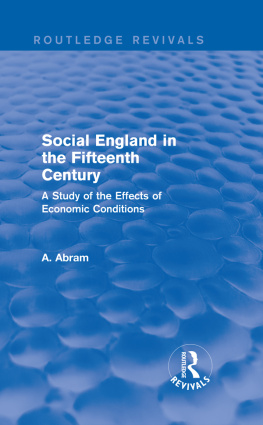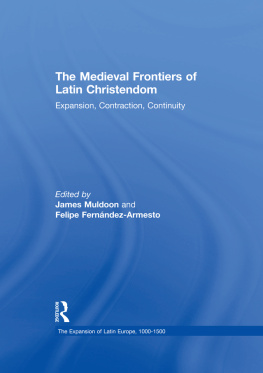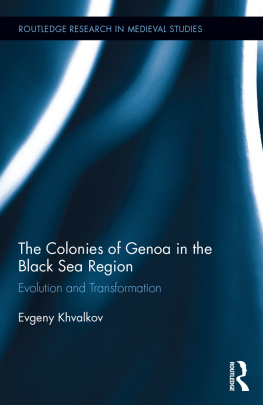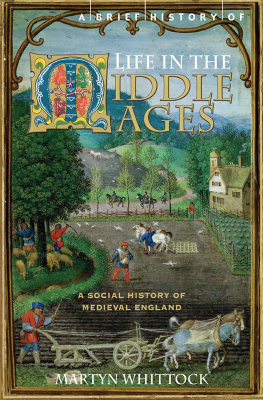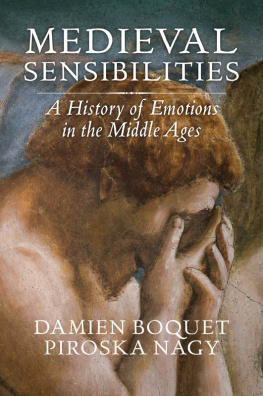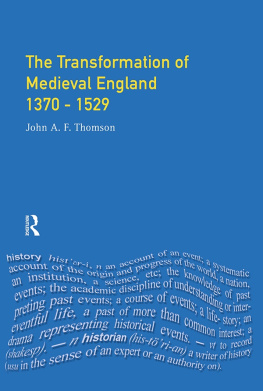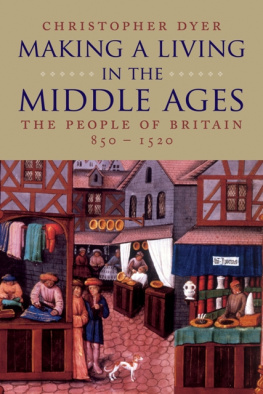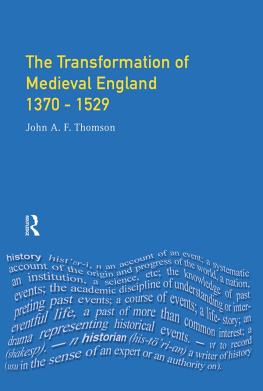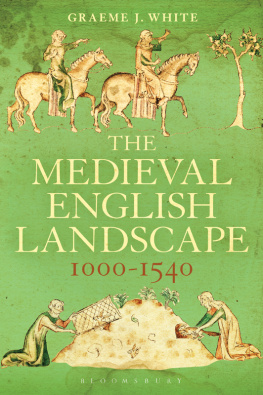The Medieval Town
1200-1540
Readers In English Urban History
General Editors:
Peter Clark and David Reeder
The Centre for Urban History, Leicester University
THE MEDIEVAL TOWN
A Reader in English Urban History, 1200-1540
Edited by Richard Holt and Gervase Rosser
THE TUDOR AND STUART TOWN
A Reader in English Urban History, 1530-1688
Edited by Jonathan Barry
THE EIGHTEENTH-CENTURY TOWN
A Reader in English Urban History, 1688-1820
Edited by Peter Borsay
THE VICTORIAN CITY
A Reader in British Urban History, 1820-1914
Edited by R. J. Morris and R. Rodger
The English Medieval Town
A Reader in English Urban History 1200-1540
Edited by
Richard Holt and Gervase Rosser
First Published 1990
by Longman Group UK Limited
Published in the United States of America by Longman Inc.
Published 2014
by Routledge
2 Park Square, Milton Park, Abingdon, Oxon OX14 4RN
711 Third Avenue, New York, NY 10017 USA
Routledge is an imprint of the Taylor & Francis Group, an informa business
ISBN: 978-1-315-84608-8 (elSBN)
Taylor & Francis 1990
All rights reserved; no part of this publication may be reproduced, stored in a retrieval system, or transmitted in any form or by any means, electronic, mechanical, photocopying, recording, or otherwise without either the prior written permission of the Publishers or a licence permitting restricted copying in the United Kingdom issued by the Copyright Licensing Agency Ltd, 33-34 Alfred Place, London, WCIE 7DP.
British Library Cataloguing in Publication Data
The medieval town: a reader in English urban
history 1200-1540. - (Readers in urban history).
I. England. Towns, history
I. Holt, Richard, 1948 June 22 - II. Rosser, Gervase 1956 May 5
III. Series
942'. 009' 732
ISBN 978-0-582-05128-7 PPR
Library of Congress Cataloging-in-Publication Data
The medieval town: a reader in English urban history
1200-1540 / edited by Richard Holt and Gervase Rosser.
p. cm.
ISBN 0-582-05129-0. ISBN 0-582-05128-2 (pbk.)
1. Cities and towns, MedievalEngland. 2. City and town life
EnglandHistory. I. Holt, Richard, 1948- II. Rosser,
Gervase, 1956
HT115.E54 1990
307.76'0942'0902dc20 89-49706
CIP
Publisher's Note
The publisher has gone to great lengths to ensure the quality of this book but points out that some imperfections from the original may be apparent.
Contents
| Richard Holt and Gervase Rosser |
| R. H. Hilton |
| G. H. Martin |
| E. M. Carus-Wilson |
| R. H. Hilton |
| D. J. Keene |
| E. M. Veale |
| Richard Holt |
| Caroline M. Barron |
| Maryanne Kowaleski |
| Gervase Rosser |
| Charles Phythian-Adams |
| R. B. Dobson |
We are grateful to the following for permission to reproduce articles:
Associated Book Publishers (UK) Ltd for 'Ceremony and the citizen' in Crisis and Order in English Towns 1500-1700 edited by P. Clark and P. Slack (Routledge, 1972); Basil Blackwell Ltd for 'The first half-century of the borough of Stratford-upon-Avon' by E.M. Carus-Wilson in Economic History Review, 18 (1965); Bristol and Gloucestershire Archaeological Society and the author, R. A Holt, for 'Gloucester in the century after the Black Death' in Transactions of the Bristol and Gloucestershire Archaeological Society , 103 (1985); Council for British Archaeology and the author, Derek Keene, for 'Suburban growth' in The Plans and Topography of Medieval Towns in England and Wales edited by M. W. Barley (CBA Research Report 14, 1976); The Historical Association and the author, Caroline M. Barron, for 'Ralph Holland and the London radicals 1438-1444' in A History of the North London Branch of the Historical Association, together with Essays in Honour of its Golden Jubilee (London, 1970); Hodder and Stoughton Ltd for 'Craftsmen and the economy of London in the fourteenth century' by E. M. Veale in Studies in London History Presented To Philip Edmund Jones edited by A. E. J. Hollaender and W. Kellaway, copyright 1969 Elspeth M. Veale; Leicester University Press, a division of Pinter Publishers, for 'Towns in societies: Medieval England' by R. H. Hilton in Urban History Yearbook (1982); The Past and Present Society and the author, R. H. Hilton, for 'Small town society in England before the Black Death' in Past and Present: A Journal of Historical Studies, 105 (November 1984), world copyright The Past and Present Society; Pontifical Institute of Medieval Studies for 'Commercial dominance of a medieval oligarchy' by M. Kowaleski in Mediaeval Studies, 46 (1984), 1984 by the Pontifical Institute of Medieval Studies, Toronto; Royal Historical Society for 'Urban decline in late medieval England' by R. B. Dobson in Transactions of the Royal Historical Society, 27 (1977), 'The English borough in the thirteenth century' by G. H. Martin in Transactions of the Royal Historical Society, 13 (1963) and 'The essence of medieval urban communities: The vill of Westminster 1200-1540' by A. G. Rosser in Transactions of the Royal Historical Society, 34 (1984).
Chapter One
Introduction: The English Town in the Middle Ages
Richard Holt and Gervase Rosser
The period between the late twelfth century and the beginning of the sixteenth marked a distinct phase in the history of the English town. Within this long span of three centuries, wider economic and social developments brought about dramatic changes in urban life. The era opened, in a context of rapid population growth, with a rising trend of urban expansion and new town foundations; by the middle of the fourteenth century that trend was reversed, and within the contracted economy of England (as of Europe in general) after the arrival of the Black Death, towns inevitably contracted both in size and numbers. Nevertheless, the period is distinguished by an underlying continuity of the essential forms of urban life, which differed in important respects from those both of earlier and of later times. The purpose of this introduction, therefore, is to provide a working definition of the medieval town in England, and to establish the general context for the particular studies that follow.
The first point to emphasize is that most English towns or the late Middle Ages were small by the standards of the modern city, or indeed by those of the greater urban centres of medieval Flanders or Italy. The majority of English towns contained fewer than 1500 people. Even so, taking into account the numerous small towns established in England by the year 1300, the country should be seen as sharing in the urbanization that affected much of Europe in the twelfth and thirteenth centuries. Secondly, the medieval European town was not differentiated from the countryside to the same extent as towns in other times and places. The English town in particular was subject to the pervasive powers both of royal government and of society at large; the town's incorporation within the wider political and social framework was consolidated by legal and fiscal developments of the thirteenth century. The assimilation of urban to rural social structures was underlined by a further distinctive trait of the medieval English town, which was the relatively undeveloped nature of urban industry. The preponderance of domestic production in medieval industry rendered unnecessary the development of a large urban proletariat, with the result that social relations in towns were not fundamentally different from those which pertained in the countryside. Finally, the social order of the English medieval town was pervaded by a set of religious beliefs which was given its definitive official form by churchmen in the thirteenth century, and which thereafter, until the Reformation, infused the language and the ritual of urban as of rural life. The sixteenth century witnessed the transformation of the medieval town in all of these fundamental respects. First, a new and unprecedented upsurge of population placed an intolerable strain upon social relations in towns as they had become defined in the late medieval period. Secondly, the successive stages of the Reformation removed the panoply of sacramental religion and ritual within which the social and political life of the towns had been played out during the preceding three centuries. The outcome, the early modern town, was in many ways a new social phenomenon.


